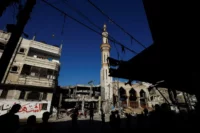
How Israel Can Win in Gaza—and Deter Iran
In the wake of Iran’s attack on Israel with hundreds of drones and missiles last weekend, Israel must decide how to calibrate its response. The spectrum of possible actions is wide and includes strikes on Iranian interests outside Iran and targets inside its borders.
Israeli leaders faced a similar decision after the Hamas attacks of October 7. Back then, the question was whether they should respond to the Hamas attack primarily by sending troops to Gaza with the goal of ending Hamas’s domination of that territory and its ability to threaten Israel militarily, or also (or instead) pursue Israel’s more powerful and dangerous adversary to the north, the Iranian-backed Lebanese militant group Hezbollah—even though it was not directly involved in the October 7 attacks.… Seguir leyendo »

